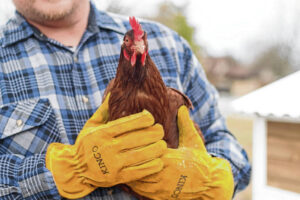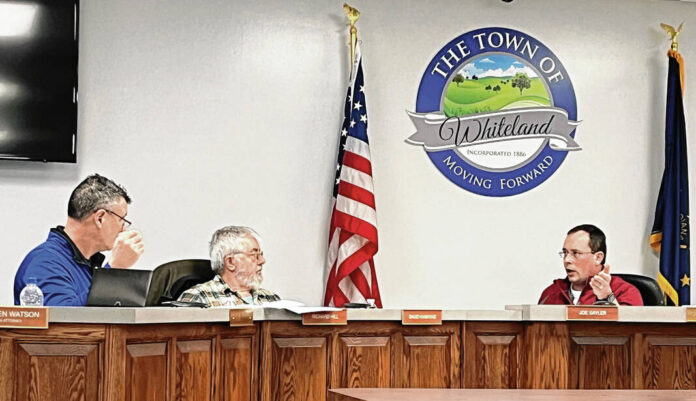Exchanges over the proposed Whiteland chicken ordinance were heated at times Tuesday.
After giving consensus to move forward with developing an ordinance to allow chickens at their meeting last month, the Whiteland Town Council debated the first draft of the ordinance at their regular meeting Tuesday night.
During the meeting, council members had tense exchanges over whether the ordinance should even be before them, the process it took to get there and the contents of the ordinance.
Despite all the discussion, no changes were made to the ordinance at the meeting. It was forwarded to the Whiteland Advisory Plan Commission for possible edits and consideration with a vote of 3-1-1, with member David Hawkins voting against the ordinance and member Richard Hill abstaining from the vote.
Currently, two ordinances in the Whiteland town code prohibit residents from owning chickens on residential-zoned lots. The town considers owning a small poultry flock a “nuisance” if it is within 200 feet or less from another person’s house, according to town code.
A third part of the code that limits households to three pets would also have to be amended to allow a special exception for people who are approved for a chicken permit under the ordinance, town attorney Stephen Watson said.
Chicken rules
The ordinance would allow chicken ownership within town limits at single-family or two-family dwellings under certain circumstances and with conditions. Residents would need to obtain a permit and would have to follow all provisions of the ordinance or risk having the permit revoked.
Chickens authorized under the ordinance would be for personal use only and products such as eggs or meat could not be offered for sale. Chicken owners must also live on the property where the chickens are kept, the draft says.
People could keep up to six adult hens on a parcel that is a quarter-acre or smaller, or up to 12 on a parcel larger than a quarter-acre. Roosters would not be permitted, the draft says.
Chickens would have to be kept in a coop that is within a fully fenced yard. Coops could not be larger than 120 square feet in area and 10 feet high, with a minimum of six square feet of run space per animal, the draft says.
Waste would have to be removed on a regular basis and the smell of the waste should not reach beyond the property line. Slaughter of the chickens would not be allowed in the front yard and would have to be performed in an enclosed area, the draft says.
Homeowners association, or HOA, covenants or deed restrictions regarding chicken keeping would still be enforceable under this ordinance, as the ordinance does not supersede private agreements, the draft says.
About the permits
Potential chicken owners would have to apply to the town and get plans for their chicken enclosure approved by the Whiteland Board of Zoning Appeals.
Much like the process to build another accessory structure, residents would need to show town officials what the enclosure will look like and where on the property it will go, the draft says.
Applicants would be required to follow the legal procedure for a public hearing, including notifying property owners within 200 feet. The property owners would be allowed to submit written objections or appear at the BZA hearing to speak on the chicken permit. If chickens would be kept on a rental property, the property owner would also have to provide consent, the draft says.
Permits would not be transferable with the property and would have an “indefinite duration.” If the permit holder does not reside at the property for 30 continuous days, the permit would terminate, the draft says.
The permit could be revoked if the holder does not comply with the ordinance conditions or refuses to allow town officials to inspect their property. The revocation can be appealed and a permit could be reinstated if conditions are met, the draft says.
Why the ordinance?
The chicken debate stemmed from a plea from resident Shawn Butler to allow him to keep his chickens. After owning them for a year, he has been notified by the town that he wasn’t allowed to have chickens.

Butler then appealed to members of the town council to change the ordinance. Discussion of the chicken ordinance was put on the agenda last month, which resulted in a consensus to create the ordinance draft.
On Tuesday, there was a lengthy debate before the meeting agenda was adopted. Hill objected to the ordinance being on the agenda because Butler’s violation of town code by keeping the chickens had not been addressed.
Council President Joe Saylor said the violation is not being addressed because town administration has not filed a formal complaint, so there is nothing to address.
Hill also questioned how the chicken discussion got started. He pointed to a Facebook post made by Butler in the “Town of Whiteland Informed Citizens” Facebook group, where he alerted group members that a chicken ordinance would be in consideration and he’s spoken to two council members about it.
Those two members were Saylor and Laura Fleury. They defended their actions and said all they did was hear a town resident who wanted to ask for their support on an issue, something that elected officials are called to do.
Hill also said he was struggling to understand why the town would allow chickens when many subdivision HOAs, including the one where Butler lives, do not allow them.
Saylor, an attorney, said HOA covenants have nothing to do with town ordinances, as they are private legal agreements and they are unaffected by the ordinance. The current draft would give the right to own a chicken flock only to people who are not otherwise restricted by their HOA, he explained.
Debate on the ordinance
Once the agenda was finally adopted and debate on chickens came up, Hill shared concerns about diseases stemming from the chickens not being well-kept, liability to the town and that the argument keeping chickens could save residents money is a poor one. He was concerned the ordinance was moving too fast and it was introduced at the “11th hour.”
Saylor argued the ordinance provides protection against diseases in that it requires coops to be cleaned regularly; that the town would have no liability as the chickens are kept on private property; that where chicken-keeping a cost-effective hobby isn’t the town’s business.
“Immediate neighbors who are wanting to have their voice heard and have it heard very clearly, will be given notice. And we don’t really have any liability,” Saylor said. “That’s our citizen’s liberty as to economics and social — that’s really the people’s business, not ours.”
Council member Brad Goedecker said he’s heard positive feedback on the ordinance and there is still time to make changes, so it makes sense to move forward with the ordinance by sending it to the plan commission.
“I’m trying to represent the constituents of the town. And the feedback that I’ve gotten this is something people are interested in,” Goedecker said. “I’m not in the business of telling everybody what to do all the time. I’m in the business of representing the people that live in the town of Whiteland and affording people their freedom to do things.”
At one point in the debate, a member of the public stood up and interrupted Saylor when he was asking the council if there were further comments. After a brief disagreement, Saylor opened it up to public comments, though there was no public hearing scheduled.
Resident Mike Hendrickson spoke up first, telling the council he is opposed to the ordinance. He is concerned that diseases, pests and predators like hawks will be a danger to children. He believes residents who aren’t in an HOA neighborhood will be left without recourse.
“I think that is not in retrospect to the whole town, it is for a certain few. Without an HOA, we are really going to end up with no protection,” Hendrickson said. “That’s just how I feel.”
Butler spoke to the town council again and addressed several of Hill’s concerns. He said the diseases that Hill is concerned about won’t be spread if you simply wash your hands after caring for chickens. Other concerns are minimized by people taking care of their chickens and removing waste or using it for fertilizer, he said.
What’s next?
The plan commission will likely hold a public hearing on the ordinance at their next meeting, which is set for April 4 at 7 p.m.
The ordinance would go back before the town council again after the plan commission weighs in.





